高一英语外研版必修一module2导学案
- 格式:doc
- 大小:879.50 KB
- 文档页数:74
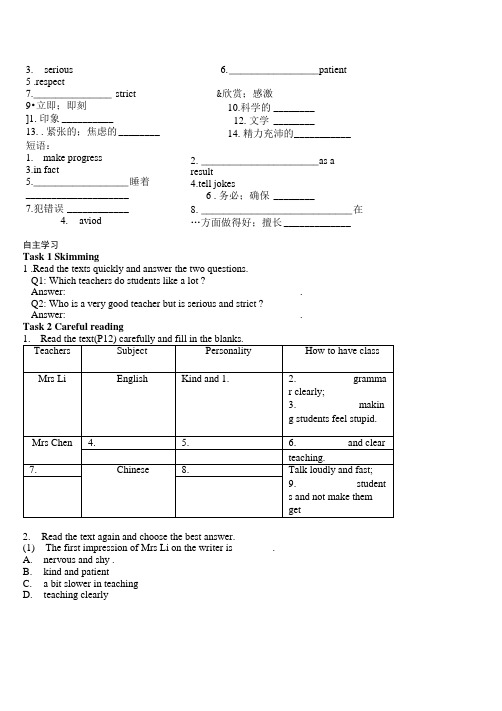
3.serious _______5 .respect _________7.______________ strict 9•立即;即刻]1.印象__________13..紧张的;焦虑的________ 短语:1.make progress ___________ 3.in fact __________5._________________ 睡着____________________7.犯错误____________4.aviod ______6.________________ p atient________________________&欣赏;感激10.科学的________12.文学 ________14.精力充沛的___________ 2. _____________________ a s a result ___________________4.tell jokes ____________6 .务必;确保 ________8. ___________________________ 在…方面做得好;擅长_____________自主学习Task 1 Skimming1 .Read the texts quickly and answer the two questions.Q1: Which teachers do students like a lot ?Answer: _____________________________________________ . Q2: Who is a very good teacher but is serious and strict ? Answer: _____________________________________________ . Task 2 Careful reading2.Read the text again and choose the best answer.(1)The first impression of Mrs Li on the writer is ______ .A.nervous and shy .B.kind and patientC. a bit slower in teachingD.teaching clearly六盘水市...中学高一英语学案Class _________ Name ____________ No. ___________课型:新授课备课人:…审核:高一英语备课组时间:2014/9/14Module 2 Book 1My New TeachersIntroduction, Reading and Vocabulary学习目标:知识及能力:1•掌握以下单词和短语:amusing , nervous , patient, serious , strict , impression , avoid , appreciate , admit, respect, relaxed , similarly , make sure , so that, make progress , as a result, in fact, fall asleep , tell jokes2.读懂课文,获取主要信息并能找出相关重点。
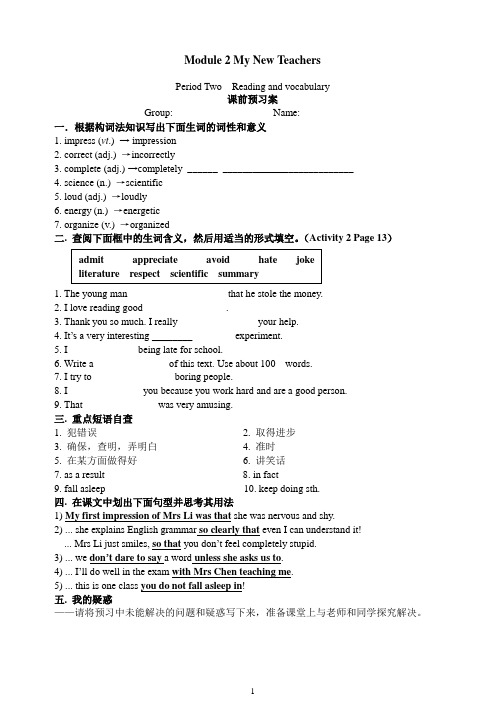
Period Two Reading and vocabulary课前预习案Group:_____________ Name:____________一.根据构词法知识写出下面生词的词性和意义1. impress (vt.)→ impression ______ _________________________2. correct (adj.)→incorrectly ______ _________________________3. complete (adj.) →completely ______ __________________________4. science (n.)→scientific _______ ______________________________5. loud (adj.)→loudly ______ _________________________6. energy (n.)→energetic _______ _______________________________7. organize (v.)→organized ______ ___________________________二. 查阅下面框中的生词含义,然后用适当的形式填空。
(Activity 2 Page 13)1. The young man ___________________ that he stole the money.2. I love reading good ________________.3. Thank you so much. I really _______________ your help.4. It’s a very interesting ________________ experiment.5. I _____________ being late for school.6. Write a ______________ of this text. Use about 100 words.7. I try to ______________ boring people.8. I ______________ you because you work hard and are a good person.9. That ______________ was very amusing.三. 重点短语自查1. 犯错误________________________2. 取得进步______________________3. 确保,查明,弄明白_____________4. 准时______________5. 在某方面做得好__________________6. 讲笑话_________________7. as a result __________________ 8. in fact _______________9. fall asleep __________________ 10. keep doing sth. ___________________四. 在课文中划出下面句型并思考其用法1) My first impression of Mrs Li was that she was nervous and shy.2) ... she explains English grammar so clearly that even I can understand it!... Mrs Li just smiles, so that you don’t feel completely stupid.3) ... we don’t dare to say a word unless she asks us to.4) ... I’ll do well in the exam with Mrs Chen teaching me.5) ... this is one class you do not fall asleep in!五. 我的疑惑——请将预习中未能解决的问题和疑惑写下来,准备课堂上与老师和同学探究解决。
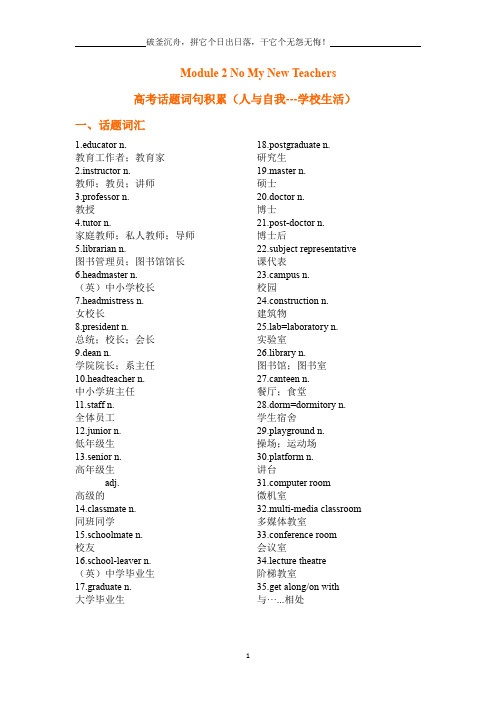
Module 2 No My New Teachers高考话题词句积累(人与自我---学校生活)一、话题词汇cator n.教育工作者;教育家2.instructor n.教师;教员;讲师3.professor n.教授4.tutor n.家庭教师;私人教师;导师5.librarian n.图书管理员;图书馆馆长6.headmaster n.(英)中小学校长7.headmistress n.女校长8.president n.总统;校长;会长9.dean n.学院院长;系主任10.headteacher n.中小学班主任11.staff n.全体员工12.junior n.低年级生13.senior n.高年级生adj.高级的14.classmate n.同班同学15.schoolmate n.校友16.school-leaver n.(英)中学毕业生17.graduate n.大学毕业生18.postgraduate n.研究生19.master n.硕士20.doctor n.博士21.post-doctor n.博士后22.subject representative 课代表23.campus n.校园24.construction n.建筑物b=laboratory n.实验室26.library n.图书馆;图书室27.canteen n.餐厅;食堂28.dorm=dormitory n.学生宿舍29.playground n.操场;运动场30.platform n.讲台puter room微机室32.multi-media classroom 多媒体教室33.conference room会议室34.lecture theatre阶梯教室35.get along/on with 与···...相处二、核心词汇识记1. v.使发笑;逗乐;使愉快→ adj.有趣的;可笑的→ n.娱乐;消遣2. n.精力;力量;能源→ adj.精力充沛的3. adj.耐心的n.病人→ adv.耐心地→ n.耐心;细致4. adj.立即的;即刻的→ adv.立即,即刻conj.一……就……5. vt.欣赏;感激→ n.欣赏;感激6. vt.承认→ n.许可;承认7. vt.& n.尊敬;尊重→ adj.表示尊敬的;有礼貌的→ adj.体面的;正派的;值得尊敬的8. v.放松;休息→ adj.轻松的;松懈的;宽松的→ n.休闲活动;娱乐活动9. adj.相似的→ adv.同样地,类似地→ n.相似;类似三、写作佳句1.Most of the students prefer universities at home,because theyand their parents can take care of each other.大多数学生想在国内上大学,因为他们可以跟父母互相照顾。
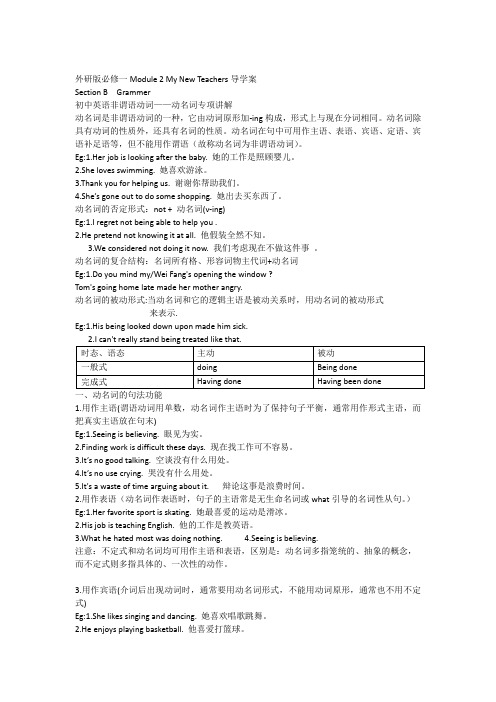
外研版必修一Module 2 My New Teachers导学案Section B Grammer初中英语非谓语动词——动名词专项讲解动名词是非谓语动词的一种,它由动词原形加-ing构成,形式上与现在分词相同。
动名词除具有动词的性质外,还具有名词的性质。
动名词在句中可用作主语、表语、宾语、定语、宾语补足语等,但不能用作谓语(故称动名词为非谓语动词)。
Eg:1.Her job is looking after the baby. 她的工作是照顾婴儿。
2.She loves swimming. 她喜欢游泳。
3.Thank you for helping us. 谢谢你帮助我们。
4.She’s gone out to do some shopping. 她出去买东西了。
动名词的否定形式:not + 动名词(v-ing)Eg:1.I regret not being able to help you .2.He pretend not knowing it at all. 他假装全然不知。
3.We considered not doing it now. 我们考虑现在不做这件事。
动名词的复合结构:名词所有格、形容词物主代词+动名词Eg:1.Do you mind my/Wei Fang's opening the window ?Tom's going home late made her mother angry.动名词的被动形式:当动名词和它的逻辑主语是被动关系时,用动名词的被动形式来表示.Eg:1.His being looked down upon made him sick.一、动名词的句法功能1.用作主语(谓语动词用单数,动名词作主语时为了保持句子平衡,通常用作形式主语,而把真实主语放在句末)Eg:1.Seeing is believing. 眼见为实。
2.Finding work is difficult these days. 现在找工作可不容易。

Module 2 My New TeachersPeriod 1 Introduction, Reading and Vocabulary课前预习一、预习目标预习Introduction及Vocabulary and Reading,初步认识和了解三位教师的教学风格。
二、预习内容1做introduction的练习题2读课文并做练习2与3三、提出疑惑写下预习中的疑惑之处。
课内探究一、学习目标1.知识目标学习并体验使用本部分的重要词汇及短语:amusing, energetic, intelligent, nervous, organised, patient, serious, shy, strict, impression, avoid, hate, incorrectly, completely, immediately, appreciate, admit, scientific, literature, loudly, wave, joke, make sure, so that, make progress, as a result, in fact, fall asleep, tell jokes2.能力目标1)提高阅读能力2)从课文中猜测单词的意思并学会正确使用3.情感目标1)明确好老师的标准2)热爱老师,同老师合作并形成亲密的师生关系4.学习重难点重点单词用法及不同教师的教学风格。
二、学习过程1.1) preview the new wordsamusing adj.有趣的,可笑的energetic adj.精力充沛的intelligent adj.聪明的nervous adj.紧张的,焦虑的organised adj.有组织的,系统的patient adj.耐心的serious adj.严肃的shy str ict adj.害羞的adj.严格1.2) Write something about a teacher you like best, using the new words above.I like ____________________ . Because _______________________________________________2.SkimmingWhat's the passage about?3.Scanning1). Which teachers do students like a lot?2). Who is a very good teacher but is serious and strict?4.Detail ReadingChoose T or F1)Mrs Li explains grammar clearly and I can follow her. ( )2)Mrs Li makes me feel stupid when I make mistakes. ( )4)Mrs Chen is very strict and some students don't like her. ( )5)Mr Wu is rather good-looking, so all the students like him.( )QuestionsDo exercise4 on page 13.Fill in the tables・5.轻松学词汇1.She's kind and patient, and ......patient adj.耐心的n.病人impatient adj.没耐心的patience n.耐心impatience n.不耐烦be __________ with 对...... 有耐心have ________ with 对...... 有耐心with ________ 二patiently 有耐心地2.She avoids making you feel stupid! 她避免让人感到愚蠢!avoid后接名词、代词或动名词做宾语。
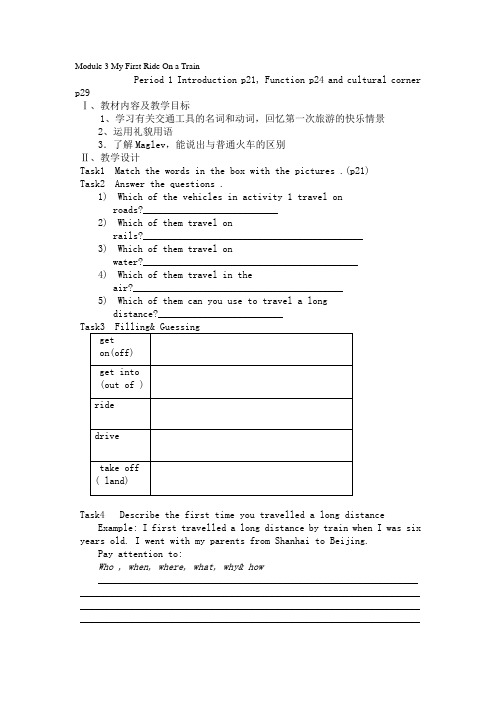
Module 3 My First Ride On a TrainPeriod 1 Introduction p21, Function p24 and cultural corner p29Ⅰ、教材内容及教学目标1、学习有关交通工具的名词和动词,回忆第一次旅游的快乐情景2、运用礼貌用语3.了解Maglev,能说出与普通火车的区别Ⅱ、教学设计Task1 Match the words in the box with the pictures .(p21)Task2 Answer the questions .1)Which of the vehicles in activity 1 travel onroads?___________________________2)Which of them travel onrails?____________________________________________3)Which of them travel onwater?___________________________________________4)Which of them travel in theair?__________________________________________5)Which of them can you use to travel a longdistance?_________________________Task4 Describe the first time you travelled a long distance Example: I first travelled a long distance by train when I was six years old. I went with my parents from Shanhai to Beijing.Pay attention to:Who , when, where, what, why& how________________________________________________________________ ____________________________________________________________________ ____________________________________________________________________ ________________________________________________________________________________________________________________________________________ _____________________________________________Task5 Read the conversation :p24 Then discuss the following Qs:1.What do you think of the ticket inspector’s atti tude?2. What expressions could you use to change it ?Act the conversation with the following sentences :Excuse meCould IWould you mindI’m very sorry butThe fact is thatTask 6 Cultural corner (p29)1). Read the following passage and find out the topic sentence of eachpart.New words:Complete: (vt)完成Magnetically: (adv)有磁性地Levitate: (v)使------飘荡Levitation: (n)升空飘荡之力Chancellor: (n)奥地利等国的总理,首相2).Read the passage again: Answer the following Qs:(A) What are the main differences between a magnetically levitatedtrain and an ordinary train?________________________________________________________________ ______________________________________________________________________________(B)What are the advantages of travelling on a Maglev train?________________________________________________________________ ________________________________________________________________ ___________________3). 探究知识点(A).具体时间的表达方法:____________________, ___________________(B). Attend: 的词义____________, 词性_________, 基本用法______________________________. 例如辨析:attend, join, take part in⏹1)attend : 指_________________________________________⏹eg.⏹2)join : 指___________________________________________⏹eg.⏹3) take part in: 指____________________________________⏹eg.(C). reached a speed of 501 kms-----⏹reach在本句中的词义________, 其它用法有__________________________________________⏹ reach up to ________________⏹这座山海拔1000米。
Module2:My New TeachersBefore class:1.Read and remember words and meanings.plete “Introduction”Activity1~3Class begin:Lesson11.Teacher:_________________________________________________________________________________________________________________________2.check the “introduction”Activity1~33.Talk about your teachers(what kind of teachers do you like?)_______________________________________________________________4.Reading:My New Teachers1.Questions:Which teachers do students like a lot?________Who is a very good teacher but is serious and strict?___________ 2.choices:(1).The first impression of Mrs Li to the writer was that she wasA.nervous and shyB.kind and patient.C.a bit slower in teaching.(2).which was NOT the first impression of Mrs Chen to the writerA.her teaching is not well organized.B.she was strict.C.she was old.(3).Mr Wu has already become popular with his students becauseA.he is handsomeB.he is full of energyC.all of the above.(4)According to the text,of the three teachers__A.Mr Wu is the youngest oneB.students like Mrs Li bestC.students respect Mrs Chen mostD.two teach languages3.Why is Mr Wu very popular with his students?______________________________________________________________________________________________________________________4.table summary.Topic My New TeachersNames _____________ Mrs Chen Mr WuSubjects English __________ Chinese literature Characteristics ____________ __________ Energetic and____Descriptions 1.Explain EnglishGrammar clearly2.Avoid makingyou______3.Go a bit too slowlyfor the______students 1.make her teaching_______2.explain exactlywhat is happening__________1.students don`t________in hisclass.2.make gesturesWhen he_____plete Activity2~4(Page13)6.Read the passage again.Lesson21.read the passage and copy the phrases in the boxnguage points.1.They said that....._____________(meaning)=____________2.Mrs Li was that........是_______从句,_____不作成分。
Modulel My New Teachers【知识点精讲】:翻译下面短语:I. admit having done sth2. show/ have respect for sb b5E2R3. play a joke on sb about sth4. be patie nt with with patie nee p1Ear b5. on time for6. be strict with sb7. be strict in sth8. as a result \9. all the time 10. be true ofII. tell the differe nee betwee n A and B12. be different from …in …13. be similar to …in …14. be popular with/ among15. leave/ have/ make a good impression on sb. DXDiT 16. make sure17. make no tes18. the private school19. the state school20. be in terested in = have/ take/ show in terest i n RTCrpb21. make sb feel stupid22. make mistakes 23 make progress24 be well orga ni zed and clear 25 do well in26 fall asleep 27 wave one ' s hands28 be fun 29. get bored完成下列句子:1 _____________ , I have never seen the film.(事实上)5PCzV2 _____________ that the lights are switched off when you leave.(确保)jLBHr。
Unit2 Grammar 名师导学案Book1 Module 2 My New Teachers (新授课) [Learning Objectives]1. Enable the students to learn expressions to describe a teacher.2. Help the students master as more adjectives as possible to describe teachers.3. Try to practice the language points in writing.[Learning Focus]1. The adjectives to describe teachers.2. Write a composition.--------------------------课堂合作探究--------------------------Language points:1. avoid vt.避免; (故意)避开She avoids making you feel stupid!avoid sb/sth逃避某人/某事avoid doing sth避免做某事avoid being done避免被…… avoidable adj.能避免的2. appreciate vt. 感激;欣赏appreciate sth./sb. 欣赏/赏识某物/某人appreciate sth./one’s. doing sth.感激某人做某事would appreciate it if...如果……,将不胜感激appreciation n. 欣赏1. avoid[完成句子]①我和他打了一架后,他设法躲着我。
After I had a fight with him, he tried to_______ _______.②大多数事故是容易避免的。
Most accidents are easily _______________③你应该避免上课迟到。
【关键字】高中【步步高】2015届高中英语 Module 2 My New Teachers同步导学外研版必修112.He is an energetic teacher and he is always full of energy.(energy)3.The party was well organised by these organisers.(organise)4.His patience gave out.(patient)5.Do you think the first impression is very important?(impress)6.They have some scientific evidence to fight against you.(science)7.Do you feel relaxed after doing so much relaxing exercise?(relax)8.He paid a formal (正式的)visit to Russia in March.9.The young teacher has some trouble with the class discipline(纪律).10.I decided to study art instead of science,because I’m fond of literature(文学).1be patient with对……有耐心beyond one’s patience无法忍受out of patience没有耐心have no patience with对……没有耐心Prime Minister Yingluck called on people to be patient with the government.英拉总理呼吁人们对政府要有耐心。
He’s a good teacher,but he doesn’t have much patience with the slower pupils.他是个好老师,但对较迟钝的学生没多大耐心。
外研版必修一Module 2 My New Teachers导学案Section A Introduction & Reading and Vocabulary教学目标1.在语境中掌握本部分单词及短语;2.养成良好的阅读习惯;3.学会划分句子成分;4.热爱自己的老师,和他们建立亲密的友谊。
学习过程A.Reading and VocabularyPre-reading(key words):1.耐心的(adj.)____________2.有组织的;有系统的(adj.)___________3.紧张的;焦急的(adj.)___________4.聪明的(adj.)_______________5.精力充沛的(adj.)____________6.有趣的;可笑的(adj.)__________7.严肃的(adj.)_____________ 8.害羞的;羞怯的(adj.)____________9.严格的;严厉的(adj.)__________ 10.印象(n.)___________________11.(故意)避开(vt.)_____________ 12.讨厌;不喜欢(vt.)__________13.(美)成绩;分数(n.)_________ 14.尊敬;尊重(vt.&n.)_________15.总结;摘要;提要(n.)___________ 16.玩笑;笑话(n.)__________17.挥(手);招(手)(vt.)____________18.大声地(adv.)_____________19.文学(n.)______________ 20.科学的(adj.)____________________ 21.承认(vt.)_____________ 22.感激(vt.)_______________________ 23.立即,即刻(adv.)____________ 24.十分地;完全地(adv.)_______25.不正确地(adv.)______________Step 1. Fast ReadingRead the passage quickly to get the general(综合的)idea.Q: 1.What is your impression of the three teachers ? (Using several words to describe them)①________________________________________________________________②________________________________________________________________③________________________________________________________________2.What is the main idea of the passage ?____________________________________________________________________________________________________________________________________3.Match the paragraphs with their main ideas.Para.1 A.Mr.Wu is a good teache because he is good looking,energeticand humourous.Para 2 B. Mrs.li is a good teacher because she is kind, patient andtolerant.Para 3 C.Mrs Chen is strict but good teacher because her teacheringis well-organisd and clear.Step 2. Careful Reading1、Choose T or F1) Mrs Li explains grammar clearly and I can follow her. ( )2) Mrs Li makes me feel stupid when I make mistakes. ( )3) With Mrs Li’s help, I begin to do better in English. ( )4) Mrs Chen is very strict and some students don’t like her.( )5) Mr Wu is rather good-looking, so all the students like him ( )2、QuestionsPara.11) What’s that girl’s first impression of Mrs Li?_________________________________________________________________2). Why do all the students like Mrs li ‘s lessons now ?_________________________________________________________________Para2.3) What do students think of Mrs Chen?_________________________________________________________________4) Why do most students in the class like Mrs. Chen?_________________________________________________________________Para35) How old is Mr Wu and how is he?_________________________________________________________________6) What does he do when he gets excited?__________________________________________________________________7) What does he do when his students get tired?__________________________________________________________________1.Fill in the blanks according to the text.Mrs li is my English teacher. She is kind and 1_________. She always avoids 2________her students 3__________embarrassed and she explains grammar 4________clearly that even poor students can understand it. They feel they can5__________with her.Mrs Chen is serious and 6_________. Even the students who keep 7_________to class late are always on time for her lessons. Most of the students 8__________her because her 9_________is well 10_______ and clear.They think they will do well with her 11_________them.Mr Wu 12__________ teaching Chinese literature. He 13________his hands a lot when he gets 14________.He often tell jokes when the students are getting 15_________.Even things like compositions and 16_______ are fun with Mr Wu. 2.key phrases1.be patient ____ 忍耐…2.be patient _____ 对…耐心3.be strict ____ sb. 对某人严格4.be strict ______ sth. 对某事严格5.be strict ______ doing sth. 对做某事严格6.agree ____ sb.同意某人(的话)7.agree ___ sth 同意某事(计划、办法)8.agree ____sth.在某方面达成协议 9.______________ 确保10.one’s fi rst impression ____... 某人对…的第一印象11.avoid ______ sth 逃避做某事 12.______________取得进步13.dare ____________ 敢于做某事14.keep______to class late 上课不断迟到15.appreciate sb _______sth 感激某人做某事16.admit ______ sth 承认做某事 17.______________ 结果18.___________ 事实上 19._____________ 睡着20.___________ 讲笑话 21.___________ 厌倦22.___________ 尊重某人四、Language Points1.positive adj.正面的;肯定的;明确的Negative adj.反面的;消极的;拒绝的2.Good teachers make sure that everyone in the class understands. (p11)【解析】make sure表示“确信,查明;务必要(做到)”make sure常用于祈使句,后面常接that宾语从句或of介词短语。
Make sure + that 从句意为“弄明白;确信”。